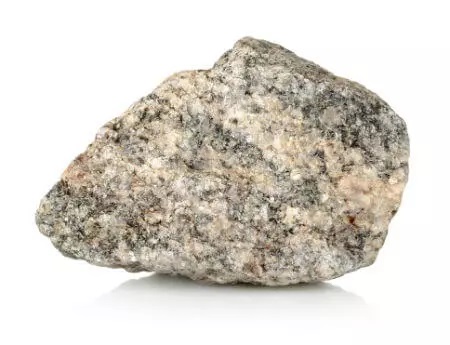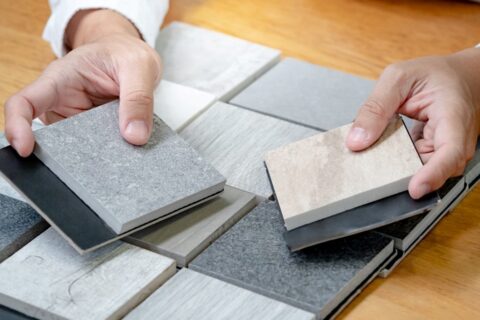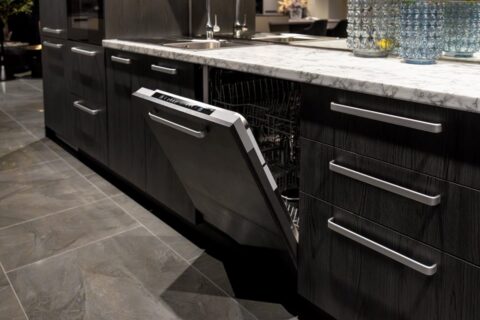Will Heat Cause Granite Countertops to Chip or Crack?
There are several advantages to granite that make it a popular kitchen or bathroom countertop option. As a natural stone, granite gives a distinct look to countertops that will last a lifetime. Aside from its enticing visual appearance, its hardness renders it extremely scratch resistant, even to a sharp knife.
Granite’s durability and eco-friendliness make it a coveted countertop material that adds considerable value to a home. But there’s another advantage of granite countertops that’s often overlooked: their resistance to heat.
Granite itself is a natural stone that forms as a result of extreme temperature changes. As liquid magma or lava cools, it hardens into many different types of igneous rock, one of which is granite. The granite stone in your kitchen countertop was probably formed millions of years ago as a result of volcanic activity.
Being born out of hot magma gives granite its hardness and density, as well as its remarkable heat resistance; granite’s melting point lies between 2200 – 2300 degrees Fahrenheit. Even when subjected to a direct flame, granite holds its structure–of course, firing a blow torch at your countertop for any reason isn’t recommended.
Because of their high heat resistance, any realistic amount of heat applied to granite countertops in your kitchen will not cause them to chip or crack. Even a red-hot cast iron skillet, which radiates at around 1300 degrees, is 1000 degrees shy of the required temperature to damage the stone.
However, this doesn’t mean you should be placing hot pans directly on top of your granite countertops. While the granite itself can withstand the heat, the countertop sealant that was either applied at installation or reapplied later is not so resistant. Heat can damage this sealant, exposing the porous granite underneath and making it more vulnerable to stains.

One of the few instances in which granite countertops could be damaged from heat is if excessive heat were to be applied over time. This could lead to softening and resulting discoloration, however, assuming that the overlying seal is intact, there is no realistic scenario in which such extreme heat would be applied continuously in any domestic environment.
If continuous heat or some other factor (such as failing to reseal a countertop when needed) does happen to deteriorate the sealant, it puts the granite underneath at greater risk for gouges and discoloration. This is just one reason why resealing your granite countertops–or countertops of any material, for that matter–should be done at least once a year, and even more frequently if you’re an avid cook.
Should your countertop sealant become compromised and discolored due to heat, there are several store-bought restorative liquids and pastes that can be used for repair. These compounds can simply be applied and wiped off to restore the surface to its original state.
Not only is granite heat resistant, it actually absorbs heat quite well. Because of this, hot dishes or pans left on a granite countertop will cool faster than normal. Therefore, it’s best to use a towel or hot pad between the pan and the counter. This not only keeps your food warm for a longer period of time, but also protects the countertop sealant from unnecessary heat stress.
While even considerable heat won’t damage your granite countertops, excessive and extreme temperature changes might. Outdoor countertops are at the highest risk in this case, as cycles of high temperatures in the Summer and low temperatures in the Winter expose them to significant fluctuations. Fortunately, there are high-density granite countertops specifically made to withstand the temperature changes associated with outdoor use.
While excessive heat overtime can cause damage to countertop sealant, you are more likely to chip or crack your granite countertops by dropping a heavy object on them. Should this occur, an epoxy solution made to match the color of the granite can be used to fill in the crack or fissure. These kinds of repairs are harder to do yourself depending on the extent of the damage, and may require contacting a professional.
When it comes to prolonging the life of your granite countertops, the best way to prevent future problems is to have them installed by a trusted professional countertop installation company. Rock Solid Custom Granite provides customized granite countertops that are installed with care and precision by our team of professionals, who treat each countertop project as if it were being installed in their own home.
To learn more about our granite countertop options and to get a free estimate, contact us today.


